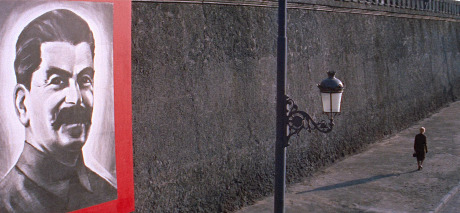Within the trappings of its somewhat old-school, ’60s widescreen-epic realm, David Lean‘s Dr. Zhivago (’65) has always been a nice warm schmaltz-bath — eye-filling, movingly scored, nicely edited, decently written and for the most part very well acted (especially by Tom Courtenay, Rod Steiger and bit player Klaus Kinski). And it looked quite good when the November 2001 DVD came out — play it on your plasma or LCD flatscreen and it’s still handsome as hell.

The new Bluray Zhivago, of course, is more desirable. More detail, delicacy, vibrancy. Cleaner, sharper, etc. I could go on and on about how this or that scene looks decidedly better due to this or that enhancement, but we all know what a well-mastered Bluray delivers, and what exacting technicians the Warner Bros. home video guys (led by Ned Price) have always been.
Price was in Manhattan earlier this week for some Dr. Zhivago promotional activities (including a 4.28 screening at the Tribeca Film Festival). He spoke to me on the phone for a few minutes on Thursday, and explained some of the challenges and aplications that brought about the necessary upgrade in the basic Zhivago elements. But I didn’t speak with Ned as long or as thoroughly as Glenn Kenny did for his 4.30 piece for The Auteurs. Read it and get back to me in the morning.
I’ll always have problems with that shot of the rainbow over the dam at the very end. To me it’s an attempt to give a nice, bright happy ending to a film that didn’t need one. The story is fairly melancholy throughout, always about longing and sometimes about finding relief or brief serenity, but mostly about the brutal forces of early Bolshevism interfering and destroying time and again. I only know that a glowing rainbow at the end of such a tale feels wrong.
And Lean’s quick cut to an electric power-line spark when Omar Sharif‘s Zhivago and Julie Christie‘s Lara brush against each other on a Moscow subway car is way too on-the-nose. A similar strategy was used by Alfred Hitchcock when he cut to fireworks during a Cary Grant–Grace Kelly love scene, but there the tone was strictly playful. On the other hand Lean, who’s telling a straightforward love story, appears to be offering a note of assurance. “Are these two are destined to fall in love or what?,” he seems to be saying. “I mean, my God, even the overhead subway wire can sense something’s up!”









